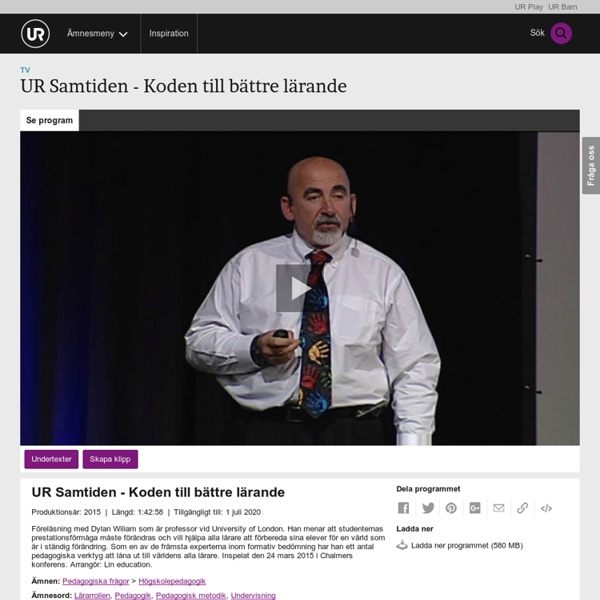



http://www.ur.se/Produkter/188784-UR-Samtiden-Koden-till-battre-larande
Related: Jobb500 Internal Server Error How you arrange your seating can be an asset for differentiating instruction. Summit Preparatory Charter High School in Redwood City, California, uses different seating configurations for independent work, collaborative work, mini lessons, and large-group discussions. Through scaffolded guidance from their teachers—which includes a personalized learning platform, daily goals, and a culture of formative assessment—students understand how they learn best and what resources they need, enabling them to choose and set up the seating arrangement that works best for them each day.
10 Assessments You Can Perform In 90 Seconds Good assessment is frequent assessment. Any assessment is designed to provide a snapshot of student understand—the more snapshots, the more complete the full picture of knowledge. On its best day, an assessment will be 100% effective, telling you exactly what a student understands. Classroom Management Tips for Co-Teachers The old adage “two heads are better than one” holds special significance in the classroom. Schools are increasingly recognizing the potential benefits of co-teaching for many students across a variety of settings. Co-teaching expert Wendy Murawski defines the strategy as “two or more educators who co-plan, co-instruct, and co-assess a group of students with diverse needs in the same general education classroom.”
Formative Assessment Strategies - Dylan Wiliam On-Demand Webinars If you haven’t had the pleasure and privilege to hear Dylan Wiliam speak before you can now access the three-part webinar series he gave last year on formative assessment. Dylan is an expert on formative assessment strategies and how to use them in the classroom to drive academic achievement. The webinar series provides a comprehensive, deep-dive into the foundation and value of his approach. Allowing Test Retakes—Without Getting Gamed Debates about exam grades and retaking tests tend to coalesce, eventually, around the same arguments. One faction prioritizes subject mastery, the idea that it’s more important to get students to take incremental steps towards proficiency than to punish them with bad grades. The other side emphasizes personal responsibility, insisting that there are very few second chances in life, and that regular opportunities to retake tests simply teach kids that consequences are negotiable. But in a recent Facebook and Twitter poll about whether our teachers allow makeup tests, the discussion took a more practical turn.
Why Formative Assessments Matter Summative assessments, or high stakes tests and projects, are what the eagle eye of our profession is fixated on right now, so teachers often find themselves in the tough position of racing, racing, racing through curriculum. But what about informal or formative assessments? Are we putting enough effort into these? What Are They? Informal, or formative assessments are about checking for understanding in an effective way in order to guide instruction.
Creating a Culture of Frequent Reflection to Improve Student Learning We know that reflection increases student learning. It supports growth mindset and encourages students to improve and learn from their mistakes. We may engage our students in reflection in our classrooms, but it’s not often habitual—I know I’ve been guilty of treating reflection as an event rather than as something we do all the time. Formative Assessments "If you can both listen to children and accept their answers not as things to just be judged right or wrong but as pieces of information which may reveal what the child is thinking, you will have taken a giant step toward becoming a master teacher, rather than merely a disseminator of information." -Easley & Zwoyer, 1975 Proof Points
Ensuring That Instruction Is Inclusive for Diverse Learners With Universal Design for Learning Humans have a tendency to fall into patterns of behavior. For teachers, that means that if we’re not careful, we begin to teach things the same way every year. This is comfortable for us, but it can result in a rigid curriculum that may not work for all students—and traditional classrooms are curriculum-centered already, not easily adapted to the differing needs of individual students. Instead, students are required to adapt to the curriculum. As a special education teacher, part of my job was helping students who had a diagnosed learning disability access the general education curriculum, so I frequently found myself co-teaching with a math or English teacher.
50+ Ways to Do Formative Assessment in Class February 22, 2015 Here is another wonderful resource shared today by Edutopia titled “53 Ways to Check for Understanding”. This 2 pages PDF features a host of useful strategies to use for formative assessment in class. Formative assessment, as we have agreed elsewhere, is assessment for learning which is completely different from summative assessment, which is assessment of learning. The insights gained from formative assessments are usually used to decide on the next instructional steps and also inform teachers as to the additional opportunities needed to ensure students' success.
Peer Coaching: Tapping Into the Expertise of Fellow Teachers In my travels to schools around the world, I have yet to encounter educators who wouldn’t benefit from peer coaching as an approach to professional learning. As in any field, professional learning should support teachers in improving their practice—there’s no point investing resources in professional learning if it’s not going to make a difference in what happens in classrooms for students. Professional learning needs to focus on the right work that’s going to impact teacher practice and student learning. Unfortunately, professional learning hasn’t always been effective or focused on teachers’ real problems of practice. Traditional models can be expensive and often disrupt student learning by pulling teachers away from class, and teachers often find them uninspiring when implemented from the top down.